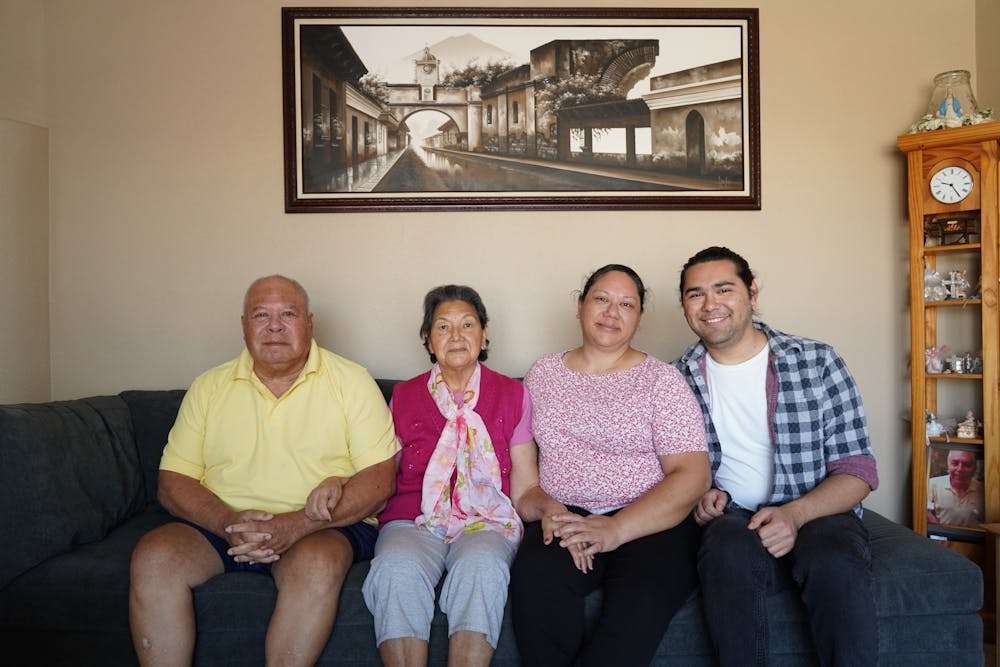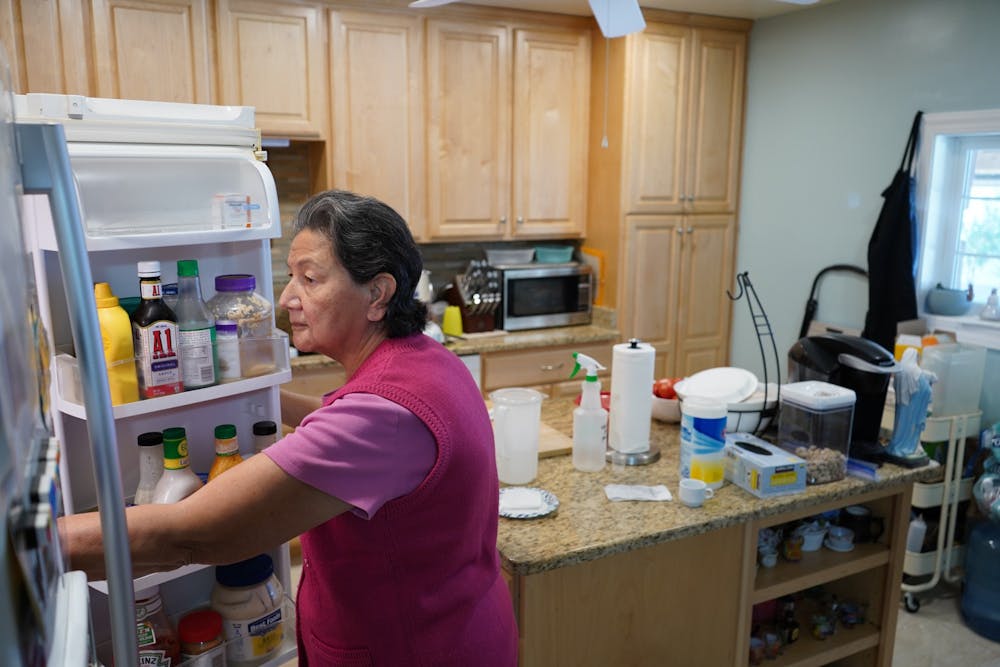“1979,” recalled my grandpa when he was telling me about our family’s journey to the States.
“November 4, 1979. We received our green cards in Guatemala and we flew in on a plane. We bought plane tickets [to Mexico] because my sister, Elsa, sent us plane tickets from Mexico [to Los Angeles]. So we had to go by bus or by plane from Guatemala to Mexico.”
He lived in a war-torn country. He fought in a civil war that had plagued his home for nearly two decades. He was on the verge of coming to the U.S. illegally. My grandfather endured all of this and ultimately followed his siblings to the U.S. in hopes of finding a better life.
“Thanks be to God, we received our green cards,” my grandma said when reflecting on that time. “We entered with the whole family: Manuel [my grandfather], me, the three kids we had. It was a relatively quick and easy immigration process.”
Because she was so young when she emigrated with my grandma and grandpa, my mother barely remembers a thing. She doesn't really recall leaving her home, her loved ones or her life as vividly as my grandparents do.
What she does remember, though, is my grandparents helping her practice saying her name in English to perfection, she said.
My grandpa, grandmother and mother all said they remember different things when I asked them about their first experiences in the U.S. as immigrants.
My grandpa, the realist, can recall the exact date they flew from Guatemala to Mexico and finally to Los Angeles.
My grandma remembers how thankful she was to be granted entry to a country she saw as holding far more opportunities than her home.
My mother — a four-year-old child, completely unaware of the bureaucracy of it all — was only worried about properly pronouncing her name in English.
It’s incredibly humbling to hear about where my grandparents came from and how they got here. When I was younger, I never really thought about how complex the immigration process was. Sometimes I forget that my mom didn't become a citizen until she was 21.
Now that I’m older, I recognize how grateful my grandparents are for the opportunities this country has given them, but I also find it interesting how younger Latine people criticize the U.S. for its history and approaches to immigration, race and abortion.
I see both sides of this coin. When my grandpa was just 14, he joined the Guatemalan military. When I was 14, I was playing with Pokémon cards. The U.S. gave my grandparents a stable life for themselves and their family. It allowed me to live a life free of war, hunger and poverty.
Despite this, here I am, condemning the U.S. for its treatment of Native Americans, for its unethical involvement in Latin American countries, for its prevalent and persistent racism, and for restricting abortion rights.
It's hard for me to write on a topic as complex as immigration because I haven't immigrated myself. I don't fully understand what my grandparents went through, and I probably never will.
Generations apart
Eileen Díaz McConnell, a professor in ASU’s School of Transborder Studies, studies Mexican migration and U.S. racial/ethnic social demography.
“It used to be easier to immigrate to the United States,” Díaz McConnell said. “There’s just a massive immigration bureaucracy. If you're even eligible for citizenship, the way that happens can take decades.”
The immigration process for my grandparents was stressful, but it wasn't the nightmare it is for others. They were most worried about my not-yet-born aunt getting a green card. My grandma was five months pregnant with her when they applied for theirs.
Once my family got to the U.S., it was a challenge for my grandparents to make money and learn a new language. My grandpa immediately went back to Guatemala for eight months to complete his 20 years of service in the military so he could retire.
Retiring allowed him to receive a pension from the Guatemalan military — about 1,000 quetzales a month. In U.S. dollars, that would have been $140-$150.
When he returned, he got his first job in the U.S. working at a restaurant owned and operated by other immigrants. It was only a seasonal position, but paid well.
“What bothered me the most, you know, we came from a poor country where you wished for food because there was nothing to eat,” my grandpa said. “When I got here we would give [restaurant customers] a leg of lamb. It looked delicioso, but the people would only do this,” he said as he mimed taking a single bite of food.
“That was one of the first things that made me… I don't know. I didn't like it.”
‘Dirty, dangerous, demanding’
One of the biggest challenges new immigrants face is integration into the broader labor force, said Irasema Coronado, the director of and professor in ASU’s School of Transborder Studies.
“The jobs of the past that had good benefits, that had insurance — it was a union job,” Coronado said. “You had vacation, retirement, a pension … Those jobs are more difficult to come by if you're an immigrant.”
My grandmother worked as a cleaning lady for rich, white people in San Francisco for 20 years. She never learned to drive, so she took the bus to work every day. She never took a day off.
My grandfather eventually worked as a garbage man for the city of San Francisco. He never took a day off throughout nearly 20 years.
My mother’s first job was answering phones at a church directory when she was about 14.
My first job was taking orders and washing dishes at my dad's restaurant when I was 17.
Seeing the generational evolution of my family’s first jobs in the U.S. is humbling. This is why my grandparents immigrated — so me and my siblings wouldn't have to take the first job we were offered and so we could miss work shifts every so often. I’m incredibly grateful for the sacrifices they’ve made for us.
“At the end of the day, many immigrants are working in dirty, dangerous, demanding jobs that no one else wants to do,” said Coronado. “You and I and the rest of society benefit when people are paid very little and are not provided benefits.”
A 2022 survey conducted by the Pew Research Center found that 53% of all Latinos reported having experienced discrimination or been treated unfairly because of their race or ethnicity, either habitually or from time to time.
Given that immigrants often work laborious jobs with no benefits and face racial discrimination in a foreign country, why would they come to the U.S.?
“I feel like they don't really have another option,” said Kevin Ortega, a first-generation American and a junior at ASU studying forensic science. “Some other country’s government is not really working for them. If they move over here, they'd rather go to a government that would help them as opposed to where they’re staying right now.”
According to another 2022 study by the Pew Research Center, a large majority of U.S. Latinos believe that the U.S. has better opportunities to get ahead, better conditions for raising kids and better access to healthcare.
Ortega is the first person in his family to potentially graduate from college. A college education is incredibly important to him and his family when it comes to building a better life in the U.S.
“When we graduated high school, I had one of my aunts from Mexico come and she was just saying how proud she was because she saw her father’s name over here,” said Ortega.
Past to present
In 1954, when my grandpa was about eight years old, the U.S. backed a coup to overthrow the democratically-elected President of Guatemala Jacobo Arbenz. He was seen by U.S. intelligence as a communist threat who acted against the interests of the infamous United Fruit Company.
Six years later, the Guatemalan Civil War broke out and my grandpa embarked on a 20-year journey of military service.
I asked him about his thoughts on U.S. involvement in Latin America.
“The gringos come to our lands and control the politics, control everything to their liking. They don't care if it's an independent country or anything. They control it and put whoever they want [in power],” said my grandpa.
“But you still love the United States?” I asked.
“Oh of course!” my grandparents said in unison.
“That’s why everybody comes over here, because they know that here, there's a future,” my grandpa said. “They work and they progress. There's a lot of people that don't like the United States, but they come over for the same reasons.”
“Students at universities don't like the United States,” my grandma interjected. “You talk to students here and the majority wouldn't give you a good reference for the United States.”
I agreed with my grandparents that many college students are critical of the U.S. In my experience, younger Latine individuals tend to look at the U.S. through a harsher lens than older Latine people, like my grandparents.
“Overall I think it is a good country, but it needs improvement — a lot of improvement,” Ortega said. He pointed to a public lack of trust in the government and “a lot of hate going on” as indicative of a need for national improvement.
Sometimes I find it hard to talk about the U.S. with my grandparents or the other older people in my family because I don't want to seem ungrateful for the sacrifices they've made to live here. But I also want to have an engaging discussion with them, rather than simply silently listen to their thoughts and perspectives.
It's important to have those conversations. Even as someone who hasn't immigrated, I feel like my side of the story is important to tell, at least to my grandparents if no one else. Nothing is black and white. By listening to different perspectives, immigrants like my grandparents will see that you can love a country for what it did for you but also abhor it for what it's done to others.
The U.S. started the war my grandpa fought in. The U.S. gave my family a life they would have never been able to have in Guatemala. And the U.S. helped me to go to college and tell my family’s story.
Despite all the shortcomings of the U.S., I find gratitude in the opportunities I’ve been given and the life my family has here.
Edited by Yamileth Cabrera, Brenda Muñoz Murguia, Alexis Moulton, Camila Pedrosa and Sam Ellefson.
Reach the reporter at ajgamiz@asu.edu and follow @systemupgraidan on Twitter.
Like State Press Magazine on Facebook, follow @statepressmag on Twitter and Instagram and read our releases on Issuu.

Aidan Gamiz is the Spanish translator for the State Press Magazine. He was born and raised in Phoenix, Arizona in a bilingual household where he learned both English and Spanish.







